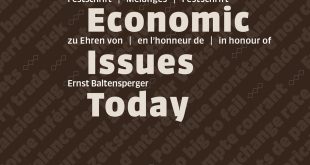In the FT, Martin Arnold reports about a new cross-border payment method tested by the Bank of England. The “interledger” program transfers money “near-instantaneously and without settlement risk.” The Bank of England set up two simulated RTGS systems on a cloud computing platform, using the Ripple interledger to simultaneously process “a successful cross-border payment”. This is not necessarily good news for the blockchain community. The Bank of England’s proof of concept is “about...
Read More »A Right to Electronic Central Bank Money?
On his blog, Tony Yates raises the question whether the general public has a right to use central bank issued electronic money? Because of inclusion considerations? Or because providing cash and reserves is a central government function?
Read More »Arguments Against Strict Monetary Policy Rules
In its July 2017 Monetary Policy Report, the Board of Governors of the Federal Reserve System discusses monetary policy rules. On pp. 36–38, the Board argues that [t]he small number of variables involved in policy rules makes them easy to use. However, the U.S. economy is highly complex, and these rules, by their very nature, do not capture that complexity. … Another issue related to the implementation of rules involves the measurement of the variables that drive the prescriptions...
Read More »“Monetary Economic Issues Today,” Panel, 2017
Panel discussion with Ernst Baltensperger, Otmar Issing, Fritz Zurbrügg and Mark Dittli (moderator) on the occasion of the publication of the Festschrift in honour of Ernst Baltensperger, Bern, June 16, 2017. SNB press release. Video (SNB Forschungs-TV).
Read More »Financial Intermediation and Standardization
On his blog, John Kay speculates about the future of financial intermediation: The paradox of modern capital markets is that although there is less and less need for market activity from the point of view of either the end users of finance, or the investors who are the ultimate beneficiaries of finance, the volume of market activity has increased exponentially. … The growth of secondary market trading at the expense of an understanding of the underlying exposure led to disaster in the...
Read More »On Cheques
On his blog, JP Koning discusses the versatility of cheques: A cheque instructs a bank to transfer deposits. It is a derivative on bank deposits. A post dated cheque serves as debt instrument, e.g., vis-a-vis pay day lenders. An uncashed cheque may serve as money if marked “to bearer” or endorsed by the recipient. Laws grant cheques currency status. A cheque may be used for payments even if other payment mechanisms break down. During the Irish banking strike of 1970, “for six months...
Read More »Currency Status
On his blog (here and here), JP Koning discusses currency status: … laws that … grant … currency status. … Say that person A is carrying some sort of financial instrument in their pocket and it is stolen. The thief uses it to buy something from person B, who accepts it without knowing it to be stolen property. If the financial instrument has not been granted currency status by the law, then person B will be liable to give it back to person A. If, however, the instrument is currency, then...
Read More »Border Adjustment Tax
On VoxEU, Mary Amiti, Emmanuel Farhi, Gita Gopinath, and Oleg Itskhoki discuss a border adjustment tax and its consequences. … a border adjustment tax … would make export sales deductible from the corporate tax base, while expenditure on imported goods would not be deductible … Therefore, if the border adjustment extends to all imports and exports, it is akin to a combination of a uniform import tariff and an export subsidy on all international trade … … it would limit the incentives for...
Read More »“Die Vollgeld-Initiative und eine Alternative (The Swiss Sovereign Money Initiative, and an Alternative),” SNB, 2017
In: Thomas Moser, Carlos Lenz, Marcel Savioz and Dirk Niepelt, editorial committee, Monetary Economic Issues Today, Festschrift in Honour of Ernst Baltensperger, Swiss National Bank/Orell Füssli, Zürich, June 2017. PDF of draft. The sovereign money initiative (Vollgeldinitiative) seeks to gain greater control over the money and credit supply, to increase financial stability and to achieve a fairer distribution of seigniorage income. The initiative’s suggested approach – a ban on active...
Read More »“Monetary Economic Issues Today,” Orell Füssli, 2017
Festschrift in Honour of Ernst Baltensperger, Swiss National Bank/Orell Füssli, Zürich, June 2017, with Thomas Moser, Carlos Lenz, and Marcel Savioz, editorial committee. Publisher’s website. From the publisher’s website: »Eine Welt ohne ein gut funktionierendes Zahlungssystem, ohne Geld- und andere Wertaufbewahrungsanlagen, ohne zuverlässige Recheneinheit, das wäre eine Welt mit einem viel tieferen Wohlstandsniveau,in der wir nicht mehr leben möchten.« Ernst Baltensperger Ursachen und...
Read More » Dirk Niepelt
Dirk Niepelt

